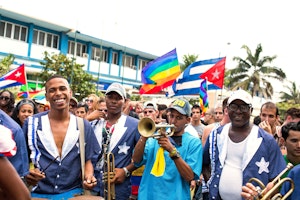The Impact of Raúl Castro’s Reforms in Cuba
In 2006, Fidel Castro retired as Cuba’s president and was replaced by his brother, Raúl. Although the shift in leadership from one Castro to another has hardly offered a serious challenge to the established power structure, Raúl Castro has introduced a sweeping set of economic and social reforms that are fundamentally altering the country.
The newly emerging economy can best be described as a public–private hybrid, in which multiple forms of production, property ownership, and investment, in addition to a much slimmer welfare state and greater personal freedoms, will coexist with military-run state companies in key economic sectors, plus continued one-party rule.
The panelists at this event looked at the new reforms, which are having a huge impact on the lives of ordinary Cubans. Listen above.
